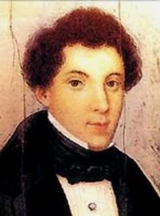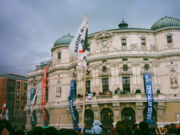
Juan Crisóstomo Arriaga
Encyclopedia
Juan Crisóstomo Jacobo Antonio de Arriaga y Balzola (January 27, 1806January 17, 1826) was a Spanish
composer
. He was nicknamed the "Spanish Mozart
" after he died, because, like Wolfgang Amadeus Mozart
, he was also a child prodigy
and an accomplished composer who died young. Whether by coincidence or design, they also shared the same first and second baptismal names; and they shared the same birthday, January 27 (fifty years apart).
, Biscay
, on what would have been Mozart's fiftieth birthday. His father and older brother first taught him music. He then studied the violin
under Pierre Baillot
, and counterpoint
and harmony
under François-Joseph Fétis
at the Paris Conservatoire. He was so talented that he soon became a teaching assistant in Fétis's class. He died in Paris at the age of nineteen, of a lung ailment, or exhaustion, perhaps both.
 Arriaga's music is "elegant and accomplished and notable for its harmonic warmth" (New Grove Concise Dictionary of Music). There is nothing characteristically Spanish or Basque in Arriaga's music. Rather it is international (European) music from the formative period between the late classical music of Mozart to the early Romanticism of the young Beethoven.
Arriaga's music is "elegant and accomplished and notable for its harmonic warmth" (New Grove Concise Dictionary of Music). There is nothing characteristically Spanish or Basque in Arriaga's music. Rather it is international (European) music from the formative period between the late classical music of Mozart to the early Romanticism of the young Beethoven.
According to Grove, Arriaga's death "before he was 20 was a sad loss to Basque music." Following his early death, with the only reliable biographical material being some reports by Fétis, Arriaga's life story was fictionalized to play into rising Basque nationalism. A public theatre
in his home city of Bilbao
carries his name.
Spain
Spain , officially the Kingdom of Spain languages]] under the European Charter for Regional or Minority Languages. In each of these, Spain's official name is as follows:;;;;;;), is a country and member state of the European Union located in southwestern Europe on the Iberian Peninsula...
composer
Composer
A composer is a person who creates music, either by musical notation or oral tradition, for interpretation and performance, or through direct manipulation of sonic material through electronic media...
. He was nicknamed the "Spanish Mozart
Wolfgang Amadeus Mozart
Wolfgang Amadeus Mozart , baptismal name Johannes Chrysostomus Wolfgangus Theophilus Mozart , was a prolific and influential composer of the Classical era. He composed over 600 works, many acknowledged as pinnacles of symphonic, concertante, chamber, piano, operatic, and choral music...
" after he died, because, like Wolfgang Amadeus Mozart
Wolfgang Amadeus Mozart
Wolfgang Amadeus Mozart , baptismal name Johannes Chrysostomus Wolfgangus Theophilus Mozart , was a prolific and influential composer of the Classical era. He composed over 600 works, many acknowledged as pinnacles of symphonic, concertante, chamber, piano, operatic, and choral music...
, he was also a child prodigy
Child prodigy
A child prodigy is someone who, at an early age, masters one or more skills far beyond his or her level of maturity. One criterion for classifying prodigies is: a prodigy is a child, typically younger than 18 years old, who is performing at the level of a highly trained adult in a very demanding...
and an accomplished composer who died young. Whether by coincidence or design, they also shared the same first and second baptismal names; and they shared the same birthday, January 27 (fifty years apart).
Life
Juan Crisóstomo Arriaga was born in BilbaoBilbao
Bilbao ) is a Spanish municipality, capital of the province of Biscay, in the autonomous community of the Basque Country. With a population of 353,187 , it is the largest city of its autonomous community and the tenth largest in Spain...
, Biscay
Biscay
Biscay is a province of Spain and a historical territory of the Basque Country, heir of the ancient Lord of Biscay. Its capital city is Bilbao...
, on what would have been Mozart's fiftieth birthday. His father and older brother first taught him music. He then studied the violin
Violin
The violin is a string instrument, usually with four strings tuned in perfect fifths. It is the smallest, highest-pitched member of the violin family of string instruments, which includes the viola and cello....
under Pierre Baillot
Pierre Baillot
Pierre Marie François de Sales Baillot was a French violinist and composer.Baillot was born in Passy and studied the violin under Giovanni Battista Viotti...
, and counterpoint
Counterpoint
In music, counterpoint is the relationship between two or more voices that are independent in contour and rhythm and are harmonically interdependent . It has been most commonly identified in classical music, developing strongly during the Renaissance and in much of the common practice period,...
and harmony
Harmony
In music, harmony is the use of simultaneous pitches , or chords. The study of harmony involves chords and their construction and chord progressions and the principles of connection that govern them. Harmony is often said to refer to the "vertical" aspect of music, as distinguished from melodic...
under François-Joseph Fétis
François-Joseph Fétis
François-Joseph Fétis was a Belgian musicologist, composer, critic and teacher. He was one of the most influential music critics of the 19th century, and his enormous compilation of biographical data in the Biographie universelle des musiciens remains an important source of information today...
at the Paris Conservatoire. He was so talented that he soon became a teaching assistant in Fétis's class. He died in Paris at the age of nineteen, of a lung ailment, or exhaustion, perhaps both.
Music
The amount of music by Arriaga which has survived to the present day is quite small, reflecting his early death. It includes:- Opera: Arriaga wrote an opera, Los esclavos felices ("The Happy Slaves"), in 1820 when he was thirteen. It was produced in Bilbao. Only the overture and some fragments have survived.
- Symphony: Arriaga composed a Symphony in D—which uses D major and D minor so equally as to not actually be in either key.
- String quartets: Arriaga wrote three sparkling and idiomatic string quartetString quartetA string quartet is a musical ensemble of four string players – usually two violin players, a violist and a cellist – or a piece written to be performed by such a group...
s at the age of eighteen. These were the only works of his published during his lifetime. - Other works: Arriaga also wrote the following:
- An octet, Nada y Mucho
- Pieces of church music: a Mass (lost), Stabat MaterStabat MaterStabat Mater is a 13th-century Roman Catholic hymn to Mary. It has been variously attributed to the Franciscan Jacopone da Todi and to Innocent III...
, Salve ReginaSalve ReginaThe "Salve Regina", also known as the Hail Holy Queen, is a Marian hymn and one of four Marian antiphons sung at different seasons within the Christian liturgical calendar of the Roman Catholic Church. The Salve Regina is traditionally sung at Compline in the time from the Saturday before Trinity...
, Et vitam venturi saeculi (lost), cantataCantataA cantata is a vocal composition with an instrumental accompaniment, typically in several movements, often involving a choir....
s (Agar, Erminia, All' Aurora, Patria) - Instrumental compositions: a nonetNonet (music)In music, a nonet is a composition which requires nine musicians for a performance, or a musical group that consists of nine people. The standard nonet scoring is for wind quintet, violin, viola, cello, and contrabass, though other combinations are also found...
, Tres Estudios de Caracter for piano, La Hungara for violin and piano, Variations for String Quartet and numerous Romances
Stature

According to Grove, Arriaga's death "before he was 20 was a sad loss to Basque music." Following his early death, with the only reliable biographical material being some reports by Fétis, Arriaga's life story was fictionalized to play into rising Basque nationalism. A public theatre
Teatro Arriaga
The Teatro Arriaga is an opera house in Bilbao, Spain. It was built in Neo-baroque style by architect Joaquín Rucoba in 1890, the same architect that built the city hall...
in his home city of Bilbao
Bilbao
Bilbao ) is a Spanish municipality, capital of the province of Biscay, in the autonomous community of the Basque Country. With a population of 353,187 , it is the largest city of its autonomous community and the tenth largest in Spain...
carries his name.
Selected recordings
- O salutaris Hostia. Stabat Mater dolorosa. Air d’Oedipe à Colone. Herminie. Air de Médée. Duo de Ma Tante Aurore. Agar dans le desert. Il Fondamento, Paul DombrechtPaul DombrechtPaul Dombrecht is a Belgian oboist performing on period instruments as well as the modern oboe. He appears frequently with other prominent musicians and baroque orchestras.He is the son of Stefaan Dombrecht, who was organist at Oostende...
. Fuga Libera FUG515 2005
External links
- Juan Crisóstomo Arriaga
- The Gramophone entry to Arriaga in The Grove Concise Dictionary of Music (1994) Oxford University Press, Inc.
- Arriaga String Quartet Nos.1-3 sound-bites and discussion of works
- Article on Arriaga's Symphony (Accessed 10.17.11)

